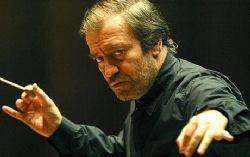|
Symphony
FROM THE NEW WORLD TO THE OLD WORLD
by Peter Lert
Saturday, June 14, 2025
Chamber
MC2 DUO RECITAL CLOSES 222'S SEASON
by Terry McNeill
Saturday, June 14, 2025
Choral and Vocal
CANTIAMO SONOMA'S LUSCIOUS A CAPELLA SINGING IN SEASON ENDING CONCERT
by Pamela Hicks Gailey
Sunday, June 8, 2025
Symphony
SRS SEASON ENDS WITH RESOUNDING TA-TA-TA-BANG
by Terry McNeill
Sunday, June 1, 2025
Symphony
YOUTHFUL VIRTUOSITY ON DISPLAY AT USO'S MAY CONCERTS
by Peter Lert
Saturday, May 17, 2025
Symphony
MYSTICAL PLANETS AND LIVELY GERSHWIN ORTIZ AT FINAL SRS CONCERT
by Peter Lert
Sunday, May 4, 2025
Symphony
VSO'S CONCERT MUSIC OF TIME, MUSIC OF PLACE
by Peter Lert
Sunday, April 27, 2025
VOCAL ELEGANCE AND FIRE AT THE 222'S RECITAL APRIL 26
by Pamela Hicks Gailey
Saturday, April 26, 2025
CANTIAMO SONOMA SINGS AN INSPIRED GOOD FRIDAY MOZART REQUIEM CONCERT
by Pamela Hicks Gailey
Friday, April 18, 2025
DRAMATIC SHOSTAKOVICH SYMPHONY CLOSES PHILHARMONIC'S 25TH SEASON
by Terry McNeill
Sunday, April 13, 2025
|
 |
 Conductor Valery Gergiev |
TO RUSSIA WITH BRILLIANCE
by Terry McNeill
Friday, November 3, 2017
Russian pianist Denis Matsuev’s high velocity and frequently slam-bang virtuosity came to the Green Music Center last year with a thrilling and equally perplexing solo performance. So many in Weill Nov. 3 were interested to hear if his pianistic style would mesh well in a concerto, and with a fine orchestra. On this day it was the legendary Mariinsky Orchestra from St. Petersburg, under the baton of international star Valery Gergiev. Qualms were put to rest at the outset.
The answer for a paltry audience of 500 was joy and a huge ovation at the conclusion of Prokofiev’s G Minor (No. 2, Op. 16) Concerto. This work was absent from programs for many years, though the wonderful Jorge Bolet championed it and recently Yuja Wang has taken it up. The technical demands for the pianist, especially in the first movement cadenza but also throughout, are ferocious, and stamina is needed as well as speed and instrumental volume. Mr. Matsuev didn’t shy away from an immense and raucous sound, and he nailed the breakneck right hand skips and thunderous repeated bass chords with seeming ease. But certainly it wasn’t an easy matter to not be covered by the 75-piece Russian orchestra playing at full tilt. A different part of the artist’s technique was evident when he captured a far away mystical and faint sound at the reappearance in the coda of the work’s first theme.
In the scherzo’s perpetuam mobile and the intermezzo his playing was seldom below a mezzo forte, though the Orchestra’s low string sound was always husky. Mr. Matsuev uses shoulder and arm weight and ample but quick damper pedal to underscore the composer’s driving rhythms and deft references to parts of the First Concerto, written when a student and about a decade prior to the G Minor. The finale was more of the same thick and dense sound, rolling along at a fast clip of formidable virtuosity. He seems happiest when the music needs fleet fingers. Mr. Gergiev’s conducting faultlessly followed every demand in the score, and the Orchestra had the right blend of Prokofiev’s motoric momentum and raw dissonance.
Recalled to the stage Mr. Matsuev played as an encore a parched and super fast finale (allegretto) to Beethoven’s “Tempest” Sonata, Op. 31, No. 2.
Following intermission was the highlight of the evening, an amazing reading by Mr. Gergiev of Strauss’ turn-of-the-20th-Century tone poem Ein Heldenleben. Op. 40. From the opening chord growl of the bass and cello sections, the sound driving Weill’s mellow wood surfaces to perfection, the playing made it clear that a special musical event was to unfold.
Tempos in the five sections were brisk with section clarity brilliantly showcased, so different from the Concerto. Mr. Gergiev’s famous conducting technique with fluttering hands and seemingly awkward movements around a nonexistent podium, is sharply different from the “control” approach of conductors such as Bruno Ferrandis, Michael Tilson Thomas and Alan Gilbert. But make no mistake, control he has, and he crafted an orchestral fabric of great beauty and intense communication.
It’s impossible to single out the ensemble’s principals in the Strauss, as no names were in the printed program, and there was no identification in the Mariinsky’s Russian websites. However, I would be remiss not mention the concertmaster’s soaring solos; the elegant and commanding oboe, clarinet, flute and bassoon playing; and the superb unisons in the horn and trombone sections. Mr. Gergiev paid little attention to extended romantic ritards, preferring to use perfectly placed cutoffs to underscore drama, especially in the Hero at Battle section. The final ascending phrases in the solo violin were elegantly shaped by the conductor, and the long fermata that ended the 42-minute work that for me could have gone on for minutes.
This Ein Heldenleben was a champagne orgy of orchestra sound, perhaps surpassing even the glorious concerts in Weill years ago of the Russian National Orchestra, the San Francisco Symphony and the Vienna Philharmonic.
The tumultuous applause produced an encore, a short brassy fanfare from Wagner’s opera Lohengrin.
Shostakovich’s E-Flat Major Symphony, Op. 70, opened the program and quickly disclosed the Mariinsky’s virtuosity. This Haydnesque Symphony is not to everyone’s taste, and some find it frivolous and overly brittle. I found the performance marvelous, the music fitting the St. Petersburg forces like an old shoe. The orchestra played it with great fervor and panache. Piccolo and flute playing was exemplary, as was cohesion in the upper strings. And the string mass, with second violins stage left, was rich and commanding.
|
